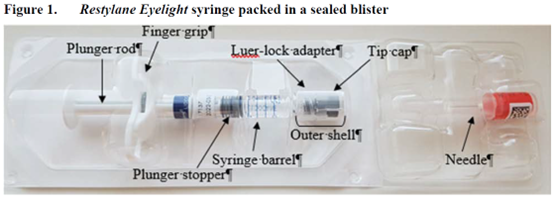Restylane Eyelight – P040024/S135
This is a brief overview of information related to FDA’s approval to market this product. See the links below to the Summary of Safety and Effectiveness Data (SSED) and product labeling for more complete information on this product, its indications for use, and the basis for FDA’s approval.
Product Name: Restylane Eyelight
PMA Applicant: Galderma Laboratories, L.P.
Address: 2001 Ross Ave Ste. 16, Dallas, TX 75201 USA
Approval Date: May 8, 2023
Approval Letter: Approval Order
What is it?
Restylane Eyelight is a gel implant or dermal filler that is injected in specific areas of the face to add definition or reduce the appearance of lines and wrinkles. It consists of the chemical hyaluronic acid, 1,4-butanediol diglycidyl ether (BDDE), and 0.3% of the drug lidocaine to reduce pain on injection.
This approval expands the use of this product to include improving the appearance of depressed, sunken, or hollow areas under the eyes (infraorbital hollowing).
How does it work?
Restylane Eyelight is injected by a doctor into the area under the eyes, between the lower eyelid and the cheekbone.
When is it used?
This new approval establishes the use of Restylane Eyelight to improve the appearance of depressed, sunken, or hollow areas under the eyes, known as infraorbital hollowing for the improvement of infraorbital hollowing in people 21 years of age and older.
What will it accomplish?
In a clinical study with 333 participants, one or two treatments with multiple injections were needed to achieve the best outcome. The results may last up to 12 months.
When should it not be used?
Restylane Eyelight is not for patients who have a history of:
- Anaphylaxis or the presence of multiple severe allergies
- Allergies to gram positive bacterial proteins
- Allergies to lidocaine or other amide type anesthetics
Additional information (including warnings, precautions, and adverse events):
- Summary of Safety and Effectiveness Data (SSED)
- Labeling (Patient Labeling)
- Labeling (Clinician Labeling)
- PMA Database Entry
- Dermal Fillers (Soft Tissue Fillers)

